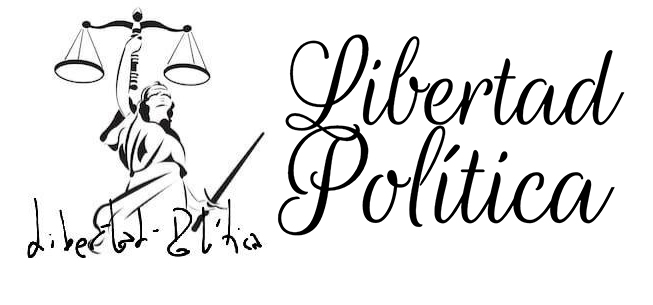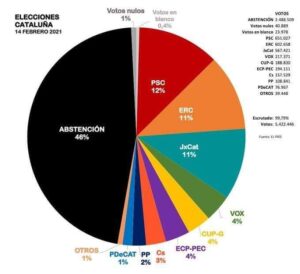Abstention in Catalonia is around 50% of electoral suffrage
It means that; Only the votes of a little more than half of the population with the right to vote are counted, and I say right, because voting is a political right and not a civil duty as many think, if it is a right it cannot be a duty. It happens that there is almost a half of the suffrage that does not want to know anything about the matter, that does not interest them, some due to political indifference and others conscientiously. That an event of this magnitude such as the Catalan elections happens what we have before us is something really unusual and significant, especially for those who want the Party State as a form of government that is established in Spain to continue in force, including the political parties, the state class and anyone who has opportunistic personal interests and wants everything to remain the same.
It happens that, with an abstention of this caliber, both the parties and the system are delegitimized, because they only count and can count on participation, which is the same as non-participation, that is, each party has a lower number of participants than all those who have not. An extraordinary fact, as we will see in the different statements of experts and political professors.
We frame the most important and transcendent data and statements to begin to address the news of this election day and that is; the census —the number of citizens with the right to vote in these elections— is made up of 5.3 million people. For the 14F a total of 265,647 people have voted by mail, which represents 4.94% of the census. In the 2017 elections – held after the October 1 referendum – 1.48% did so. With voting by mail, turnout has barely exceeded the 50% threshold. If the political analysts agree on something, it is that the high percentage of participation registered in The Catalan elections of 2017, almost 82%, will not be repeated in the elections scheduled for February 14, 2021 . That electoral appointment was marked by a pro-independence challenge that resulted in the application of article 155 of the Constitution.
We can see leading municipalities in this electoral political event, both participants and non-participants;
The historic abstention has been one of the main protagonists in the elections to the Parliament of Catalonia of 2021. After the record of participation of 2017, when 79.09% of the voters went to vote, this time it has gone to the opposite extreme , 53.55%. The municipalities with the most abstention were El Montmell, Alfara de Carles, La Bisbal del Penedès and Sant Adrià de Besòs. In the first, abstention has risen to 67.46%, that is, only 32% of voters have gone to vote. In the second, abstention has reached 61.46%. In the third, 59.5% and in the fourth, 59.36%.En el polo opuesto, las localidades con mayor participación han sido Torroja del Priorat, Alpens, Gisclareny y Espinelves. En todas ellas la abstención apenas ha alcanzado entre el 15% y el 20%. En el mapa que sigue a estas líneas se pueden consultar todos los datos de abstención en Catalunya; El Montmell, Alfara de Carles, La Bisbal del Penedès y Sant Adrià de Besòs lideran la clasificación de los abstencionistas. Los municipios con el porcentaje de participación más elevado han sido Torroja del Priorat, Alpens, Gisclareny y Espinelves.
In the historical electoral registers, since 1980, so little participation in the elections to the Parliament of Catalonia was recorded. We can see here and we will develop all the details about the electoral data of this campaign, from the comparison with the last elections of 2017 to the impact of the vote by mail.
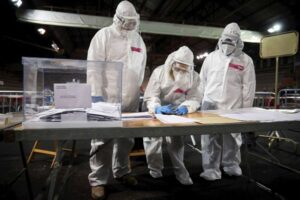 The Catalan elections were held last Sunday, February 14. Elections marked by the extraordinary and paranormal situation of a false pandemic, with additional exaggerated and absurd security and protection measures, which have been present throughout the day at the polling stations. The Covid-19, contrary to what the state media reveal to us, has not had a direct impact on the participation of voters in Catalonia, since the vote could be carried out by mail. To the record increase in voting by mail, some striking figures have been added with respect to the past elections that took place last year 2017. Something that can lead us to deduce that the reason for NOT participating in the polls is not the viral cause .
The Catalan elections were held last Sunday, February 14. Elections marked by the extraordinary and paranormal situation of a false pandemic, with additional exaggerated and absurd security and protection measures, which have been present throughout the day at the polling stations. The Covid-19, contrary to what the state media reveal to us, has not had a direct impact on the participation of voters in Catalonia, since the vote could be carried out by mail. To the record increase in voting by mail, some striking figures have been added with respect to the past elections that took place last year 2017. Something that can lead us to deduce that the reason for NOT participating in the polls is not the viral cause .
Relevant data on election day.
- Participation drops 12 points compared to 2017 at 1:00 p.m.
Participation at 1:00 p.m. was already at 22.59%, 12 points less than in the 2017 elections, when at that time it reached 34.69% . Five hours later, the drop in voters was accentuated: at 6:00 p.m., 45.67% of the census had cast their vote, when in 2017 it had already reached 68.26% . The first advance of participation, after noon, marked a trend that was going to consolidate at 6:00 p.m., just two hours before the closing of the polling stations and with the last strip reserved for people infected with coronavirus. At the end of the day, and with the inclusion of the vote by mail, the turnout stood at 53.42%, far from the 79.09% of the elections of December 21, 2017. The vote by mail has been exceptionally high (it has grown by 350%, an absolute record in an election), but it has not compensated for the drop in the ballot box vote.
- 22-point crash at 6:00 p.m.
The one at 6:00 p.m. supposes a participation of 22 points less than in 2017, the lowest at this time since 1992 . A more than considerable figure that Minister Bernat Solé has attributed to the “context of pandemic”, to the recommended time slots according to population groups and to almost 270,000 people who have voted by mail, something ridiculous and demagogue when it is clear that participation by mail is just as possible.
- A participation of 53.52% at the close of the polls
PSC and ERC have tied for seats after completing the vote count for these 2021 elections. These are the elections with the lowest turnout dating from 1980 as we said at the beginning of this newsletter. Only the data for 2006, with a 54.4% share, comes close. In this scenario, the independentistas and the state party of Santiago Abascal have managed to add more seats than in their entire history, which has entered the Catalan parliament with 11 deputies.
Words from the former secretary general of the PSC, Miquel Iceta, _ “It is the best result of the match since Pasqual Maragall” _, candidate who presided over the Generalitat from 2003 to 2006 and who won 42 seats in the 2003 elections, when the turnout was 60.9%. Maragall managed to govern thanks to an alliance with ERC and Iniciativa per-Catalunya Verds – Esquerra Unida i Alternativa (ICV-EUiA).
- The total data on participation in the elections in Catalonia have collapsed. Only around 53% of Catalans have participated in these elections on February 14, 2021.
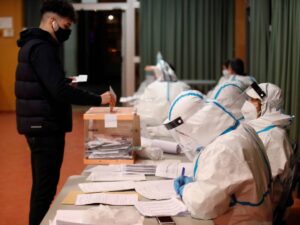
The final data for participation in the Catalan elections in 2017 was 81.94%, a record figure. On the other hand, the participation in this year is extraordinary and atypical with respect to the previous ones, also marked by a supposed pandemic, not because of its dangerousness, but because of the absurd and ridiculous protocols of security and protection of the means and facilities to address this election day.
- The independence movement, which is mistakenly called nationalism, since its political objectives are purely state powers, that is, stateism.
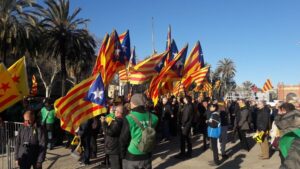 There is a great perception that there is no longer a threat of rupture, a cessation of statist intentions and the crime of sedition that a significant part of the Catalan people intend; given that the independence movement lacks a roadmap and is simply based on ideals and proposals to achieve state powers, together with a pandemic situation and the satiety that it generates in the citizen, that appearance of a dispute between party oligarchs , which is only pure competition for money and fame and some position in state institutions, can favor abstention; also the infinite social saturation with respect to the public and daily restrictions of the past year 2020 and that are currently maintained today . Everything has led between some things and others in which the protagonism of the independence movement that lately joined hand in hand with almost all the political events of recent years, it turns out that it has declined and even disappeared, not completely, but has remained in a background.
There is a great perception that there is no longer a threat of rupture, a cessation of statist intentions and the crime of sedition that a significant part of the Catalan people intend; given that the independence movement lacks a roadmap and is simply based on ideals and proposals to achieve state powers, together with a pandemic situation and the satiety that it generates in the citizen, that appearance of a dispute between party oligarchs , which is only pure competition for money and fame and some position in state institutions, can favor abstention; also the infinite social saturation with respect to the public and daily restrictions of the past year 2020 and that are currently maintained today . Everything has led between some things and others in which the protagonism of the independence movement that lately joined hand in hand with almost all the political events of recent years, it turns out that it has declined and even disappeared, not completely, but has remained in a background.
But who benefits from this disincentive to vote? A question that a large part of society is highly misinformed. Although some political experts analyze the chronicle of the Catalan electoral day, they do not make the idea and the phenomenon of the ABSTENTION sufficiently clear, it is not fully defined clearly to society this concept, something as simple as saying, that abstention, a phenomenon more than feared by the state class and political parties, what causes is a delegitimization not only of the parties but of the system as well and that as we can see, that The word participation is the protagonist of the news is not something accidental, it is something worrying especially for the state class, because the distribution and the moral authority that they have is no longer so welcome; Let’s see what some professors and professors say in the state media;
.
- Paris Grau , professor of Political Science at the University of Barcelona (UB), recalls that “in the 2017 elections, marked by a hot autumn, the constitutionalist voter went out to vote. And for the first time a non-nationalist party wins them: CITIZENS . The orange formation, led by Inés Arrimadas , manages to lift from the sofa a large number of Catalans who had abstained in previous races”. The political scientist Paris Grau says that * * * That victory, which did not lead them to the presidency of the Generalitat, has not served to bring together the rest of the constitutionalist formations around them. What’s more, it looks like a headless chicken : head of list changes, possible outputs to VOX … In the elections that seem to take place in February 2021, Ciudadanos does not seem to repeat victory, but neither does it seem that the constitutionalist voter will come out en masse again to vote” _.
The pacts and consensuses
 In this sense, and given the possibility of abstention so feared by the state parties, it is leading the different non-independence parties; and taking advantage of the lubricant of the Partitocracy, the political consensus, to seek alliances between them, some of them even almost unnatural, where the voter will not find any reason with said pact and will fully allocate his vote to personal failure in the public, as every time that happens when these types of pacts occur, so everyday in the day-to-day of political life in Spain. In 2017, the pro-independence voter also mobilized, since the intention in those elections was to bring back Carles Puigdemont, protected and settled by virtue of the impudence by the government of Rajoy and Mr. Casado, < / b> and the prisoners. Something very different has happened in these last votes for the participants of the independence movement, leaving such an idea in the background.
In this sense, and given the possibility of abstention so feared by the state parties, it is leading the different non-independence parties; and taking advantage of the lubricant of the Partitocracy, the political consensus, to seek alliances between them, some of them even almost unnatural, where the voter will not find any reason with said pact and will fully allocate his vote to personal failure in the public, as every time that happens when these types of pacts occur, so everyday in the day-to-day of political life in Spain. In 2017, the pro-independence voter also mobilized, since the intention in those elections was to bring back Carles Puigdemont, protected and settled by virtue of the impudence by the government of Rajoy and Mr. Casado, < / b> and the prisoners. Something very different has happened in these last votes for the participants of the independence movement, leaving such an idea in the background.
 It is Puigdemont who adds, and after creating La Crida, kill Convergència (CDC) and refound in the PDE CAT , create Junts per Catalunya, a split of the Partit Democrata, has decided not to top the list. They have preferred that the militancy decide who their candidate should be: Borras or Calvet “. This step next to the fugitive, protected by Rajoy and his governmental institutions, ¿ Will it favor mobilization or abstention in that independence space? What is certain is that ‘broadening the base’ does not seem to be the way chosen by those of Puigdemont. Either you are with me, or you are against me “, referring to the cessation of Angels Chacon as a councilor and, more recently, the district councilors of PDE CAT in Barcelona.
It is Puigdemont who adds, and after creating La Crida, kill Convergència (CDC) and refound in the PDE CAT , create Junts per Catalunya, a split of the Partit Democrata, has decided not to top the list. They have preferred that the militancy decide who their candidate should be: Borras or Calvet “. This step next to the fugitive, protected by Rajoy and his governmental institutions, ¿ Will it favor mobilization or abstention in that independence space? What is certain is that ‘broadening the base’ does not seem to be the way chosen by those of Puigdemont. Either you are with me, or you are against me “, referring to the cessation of Angels Chacon as a councilor and, more recently, the district councilors of PDE CAT in Barcelona.
- Gabriel Colomé , Professor of Political Science at the Autonomous University of Barcelona (UAB); _ “Participation will not be as high as in 2017. The context is not the same, since then there was a maximum polarization and emotion “. In his opinion he announces that _ “it is difficult to predict the turnout for 14F, there is a long way to go and we don’t know what may happen until the day before the elections. We know that participation will not be repeated, but not how much it will decrease and who it will affect “_. However, the specialist points out several factors to take into account;” will it affect fragmentation and the struggles in the independence world? eight years of immobility ?, Will the resignation of the electoral distortion in favor of the independentistas affect, (we have to point out from this newsletter that; the vote in traditionally sovereign fiefdoms is worth more than that of the metropolitan area, which proves that there is no democracy and the electoral system is not rigorous for the whole society equally)? Will it affect the disappearance of the emotional impulse? Depending on the reaction to each question, abstention will be higher or lower ”_.
- Oriol Bartomeus , professor at the UAB, believes that the foreseeable decline in participation may benefit the pro-independence parties . “The lack of a horizon, of a roadmap could discourage voting, but the quarrel between Junts per Catalunya and ERC could be a stimulus for this voter, and the fact that sovereignty has always considered, as a starting point, that these choices are very much theirs, it can cause abstention to affect them less,” says Bartomeus. The teacher and writer does believe that there is a disenchantment of the public with respect to the management of their rulers, (we add from this newsletter that there is no management in Spain since that there is no politics or citizen representation). “Disaffection can affect everyone. The opposition parties do not have a good alternative proposal, they represent a fragmented and headless space. There is also a bad atmosphere between the independence parties, between Junts per Catalunya and ERC , but that is already part of their modus vivendi , it is already incorporated into your vote,” he says.
Differential abstention between general and regional elections in Spain has two recurring characteristics: it is higher in the autonomous communities of Catalonia and Madrid, and it tends to be concentrated in the metropolitan areas of the cities of Barcelona and Madrid. What can explain these two territorial patterns? To the attempts to explain what happened in many state media, the causes and explanations of the phenomenon are very recurrent as long as they do not fit in with reality, some of these explanations we have in statements like what;
– the main conclusion is that the demobilization registered in these elections is related to some features of the sociodemographic structure of the areas metropolitan areas of both communities: greater presence of young electorate, greater unemployment and percentage of voters not born in the autonomous community;
-on the other hand, a political factor such as the electoral establishment of the PSOE also appears as a significant element to explain the differentials of abstention. The combination of the cited elements allows a clearer image of who stops voting in these regional elections and provides new clues to construct a more general explanation of the phenomenon of the so-called differential abstention.
– Another argument and explanation given by the media is that the abstention was given out of fear of contagion, because of the possible viral infection on the suspected pandemic issue.
From this information medium provided by the Libertad-Politica.com website, we want to draw conclusions and make a brief summary of what happened on this Catalan electoral day, starring the notable and extraordinary abstention, a significant factor in the counterproductive effects of the Party State in society and its breakdown, that of society itself, produced by the invention of autonomies and especially if we talk about the Catalan people.
We have to make it clear that such a high abstention, as we said at the beginning of this newsletter, is a symptom of social rejection to government institutions in one way or another, that you do not participate in what you do not want to participate or is considered unproductive or bad. We can speak then that Catalan society, making use of common sense not to participate in a political event where participation changes absolutely nothing, has struck the table to say no to partitocracy and the game at hand. the state class in said autonomy. That there are many years of oppression that the Catalan people are suffering with the issue of independence, something anomalous and at least heavy and tiresome for the individuals who make up the Catalan people and feel Spanish; And that it is from Madrid where the real problem comes from, that is, we do not refer to Madrid as an existential physical city, but to the governmental institutions that from there control and direct the regime of power and distribution to all the autonomies or small living states and living within the Spanish borders that form a subset within the group that is the State. There is no more responsible for what happened in a crime of sedition such as independence, whether Catalan, Basque or wherever, than the institutions of the central government.
We want to end with this newsletter, the first on this website, and in our positive opinion, since for us, in any case, not participating in any political event of the State Party Regime of 78 that exists in Spain, is to heal in health and save one’s dignity, because it is useless to participate when there is no possibility of choosing or deciding absolutely anything at the ballot box, we believe and summarize this day in Catalonia as positive and hopeful in terms of the abrupt change that non-participation entails With respect to other times, it is significant and an undoubted reflection of the thought of the Catalan people, of course an example to follow of dignity and courage; especially if not voting was a conscientious act for change, that is, those who have not participated today because they know that there is no democracy and they hope to do so when there is one.
An exquisite greeting for the reader, for all those who follow us and for those who do not, as well as theirs It is the responsibility of Political Freedom, which is so much needed in Spain. Until another episode.
Text and summary written by HR Antonio, February 20, 2021.
